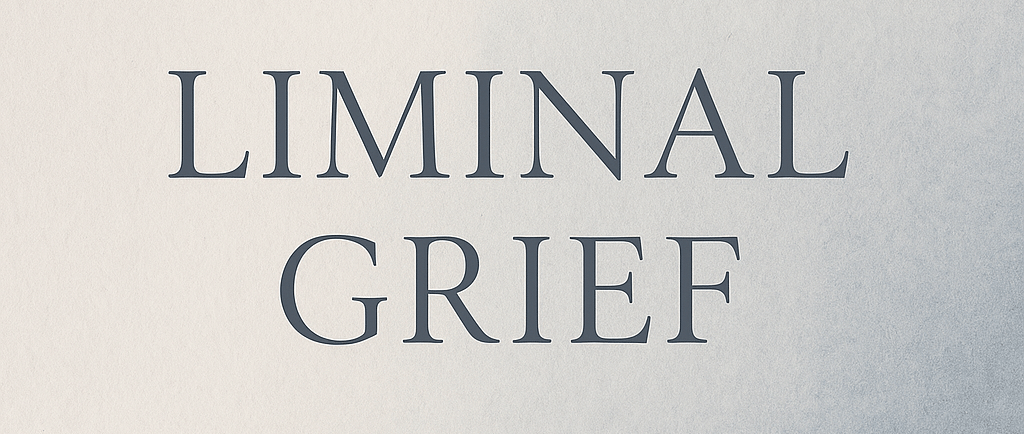Liminal Grief
How to survive the no-longer, not-yet of it all
Michelle Carlin
8/10/20253 min read


Liminal Grief: That Strange Ache Between Letting Go and Moving On
There’s a flavor of grief that doesn’t get named nearly enough.
It’s not the raw beginning, that burning ache of immediate loss.
And it’s not the firm-footed ending either, when you’ve integrated the heartbreak and reclaimed your footing.
It’s the stretch in between.
The blurry middle.
That disorienting phase where you're not in it anymore, but you're also not really out of it.
This is liminal grief.
And if you’ve ever stood at the doorway of a life you’re no longer living, unsure of how to return and equally unsure of how to move forward, you’ve been there.
Liminal Grief Feels Like...
A phantom limb of something you let go of, but still feel
Waking up tired, even though the crisis has passed
A wave of sadness for something you consciously chose to end
Second-guessing yourself at 2AM, did I really do the right thing?
Nostalgia laced with nausea
Wanting to run and collapse at the same time
It shows up in your gut, in your joints, in your appetite and sleep.
It scrambles your sense of time.
It makes you question your healing.
It whispers, “Why aren’t you over this yet?”
The Nervous System Knows Before the Mind Does
What I’ve learned (the hard way) is that grief doesn’t begin and end on a calendar.
It’s not logical.
It’s not obedient.
It moves through the body like weather, sometimes slow and gray, sometimes a full-blown thunderstorm in your chest.
And this particular kind of grief, the liminal kind, tends to flare right after the practical work is done.
The door is closed, the final text is sent, the dog bowl is gone, the office is cleaned out, and suddenly your system goes into a kind of energetic freefall.
Because now what?
It’s Not That You’re “Stuck,” It’s That You’re Rewiring
Here’s the reframe that helps me the most:
Liminal grief isn’t a failure to move on.
It’s the natural friction that occurs when an old identity dissolves and the new one hasn’t yet arrived.
It’s a psychic molting. A cellular shedding. A limbo.
Your mind may know what happened.
Your body may even agree.
But your heart? Your nervous system? Your unconscious?
They're slower.
They want rituals. They want softness. They want to make meaning.
What Helps in the Meantime?
Liminal grief asks something very different from us than acute loss.
It doesn't need urgency. It needs presence.
It needs you to stay in the hallway, even when it’s boring, even when it’s lonely, even when you just want to know already what’s next.
Here’s what I try to do:
Give myself permission to feel relief and grief in the same breath
Notice when I’m narrating stories of failure or “should have” and gently return to what is
Stay curious about the body’s signals, especially the subtle ones like thirst, exhaustion, hunger for connection
Create beauty, even when I don’t feel like it, a soft song, a walk, a cup of tea in a mug I like
Let go of the pressure to make the pain poetic. Sometimes it’s just pain
Trust that forward motion is happening, even when it’s invisible
A Final Word
You don’t have to be okay yet.
You don’t have to know where you’re going.
You don’t have to make meaning from it right away.
You’re in the liminal.
It’s not meant to be solved. It’s meant to be moved through.
If all you can do today is drink water and not gaslight your grief,
you’re doing enough.
And one day, you’ll notice
something has shifted.
A new root has taken hold.
You’re still you, just more true.
